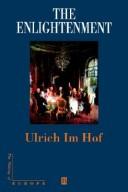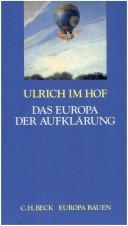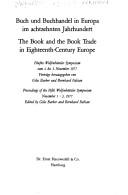| Listing 1 - 10 of 29 | << page >> |
Sort by
|
Book
ISBN: 9783050055855 3050055855 9783050041339 Year: 2005 Publisher: Berlin De Gruyter
Abstract | Keywords | Export | Availability | Bookmark
 Loading...
Loading...Choose an application
- Reference Manager
- EndNote
- RefWorks (Direct export to RefWorks)
Francesco Bianchini gehört zu den herausragenden Gestalten der europäischen gelehrten Welt am Beginn des 18. Jahrhunderts. Sein wissenschaftliches Werk reicht von astronomischen Schriften über eine unvollendete Istoria universale bis zur aufwendigen Publikation archäologischer Ausgrabungen. Als Ehrenmitglied der königlichen Akademien in Paris und London korrespondierte er mit den führenden Gelehrten seiner Zeit, so mit Leibniz und Newton. Die weitverzweigten Forschungsinteressen Bianchinis eröffnen ein Panorama frühneuzeitlicher Bildungs-, Wissenschafts- und Institutionengeschichte. Sein Leben und Werk fügen sich in die erkenntnis-, wahrnehmungs- und wissenschaftstheoretischen Kontroversen und forschungspraktischen Errungenschaften seiner Zeit ein. Er propagierte die Überlegenheit der Bild- über die Schriftquellen sowohl im Sinne der historischen Wahrheitsfindung als auch hinsichtlich der aus der Antike abgeleiteten Gedächtnis- und Wahrnehmungstheorien. Neben der Forschung galt seine Aufmerksamkeit der Vermittlung von Wissen, bei der das Bild sowohl als eigenständiger Beleg wie als mnemotechnische Stütze von zentraler Bedeutung ist. Trotz dieses ungewöhnlich breit gefächerten Lebenswerkes, seiner weitreichenden Anerkennung zu Lebzeiten und einer hervorragenden archivalischen Überlieferung blieb Bianchini bisher in den jüngeren Forschungen zur Wissenschafts- und Kulturgeschichte des frühen 18. Jahrhunderts weitgehend ausgespart. Diese Lücke sollte ein international und überdisziplinär konzipiertes Kolloquium zumindest teilweise schließen, das im September 2003 am Institut für Europäische Kulturgeschichte in Augsburg stattfand und dessen Beiträge in dem vorgestellten Band dokumentiert werden. Mit Beiträgen von Valentin Kockel, Brigitte Sölch, Irene Favaretto, Werner Oechslin, François de Polignac, Meinrad von Engelberg, Susan Dixon, John L. Heilbron, Christopher Johns, Paolo Liverani, Petra Thomas.

ISBN: 0631175911 9780631175919 Year: 1994 Volume: *3 Publisher: Oxford Blackwell
Abstract | Keywords | Export | Availability | Bookmark
 Loading...
Loading...Choose an application
- Reference Manager
- EndNote
- RefWorks (Direct export to RefWorks)
History of Europe --- Political philosophy. Social philosophy --- anno 1700-1799 --- Enlightenment --- Europe --- History --- Intellectual life --- 18th century --- Enlightenment - Europe --- Europe - History - 18th century --- Europe - Intellectual life - 18th century
Book

ISSN: 12864730 ISBN: 9782745345585 9782745345592 2745345583 Year: 2018 Volume: 17 Publisher: Paris Honoré Champion
Abstract | Keywords | Export | Availability | Bookmark
 Loading...
Loading...Choose an application
- Reference Manager
- EndNote
- RefWorks (Direct export to RefWorks)
Cet ouvrage rassemble quatorze articles présentés lors du Séminaire international des jeunes dix-huitiémistes de la Société internationale d’étude du dix-huitième siècle (SIEDS – ISECS) qui s’est tenu à l’Université d’Indiana à Bloomington (États-Unis), du 2 au 7 juillet 2012. Le thème du séminaire, "Libertés des Lumières", a inspiré une diversité d’approches reflétant celle des conceptions de la liberté au XVIIIe siècle. Les études réunies dans ce volume relèvent d’une pluralité de disciplines, depuis l’histoire, la philosophie et la littérature jusqu’aux sciences politiques et aux études religieuses, en passant par l’histoire de l’art et du théâtre. À ce caractère interdisciplinaire de l’ouvrage s’ajoute une dimension pleinement européenne et atlantique, puisque s’y trouvent prises en compte l’Europe occidentale, la Scandinavie et l’Amérique coloniale.
History of civilization --- anno 1700-1799 --- Enlightenment --- Liberty --- Europe --- Congresses --- Intellectual life --- Enlightenment - Europe - Congresses --- Liberty - Congresses --- Europe - Intellectual life - 18th century - Congresses
Book
ISSN: 19627505 ISBN: 9782713227721 2713227720 Year: 2019 Volume: 83 Publisher: Paris : Éditions EHESS,
Abstract | Keywords | Export | Availability | Bookmark
 Loading...
Loading...Choose an application
- Reference Manager
- EndNote
- RefWorks (Direct export to RefWorks)
L'histoire de la philosophie est une invention des Lumières. En Allemagne comme en France, cette discipline nouvelle a contribué à façonner l'imaginaire occidental moderne en opérant une double colonisation savante de la pensée. Colonisation du temps, d'une part: l'Européen est considéré dorénavant comme le fruit d'une histoire longue de la pensée qui, grâce aux révolutions scientifique et morale, aboutit à l'âge de la raison, de l'autonomie et de la modernité. Colonisation de l'espace, d'autre part : les historiens de la philosophie, à l'instar des ethnologues ou des linguistes, distinguent désormais l'Europe des autres « cultures», qui deviennent le terrain des enquêtes empiriques. L'Europe est ainsi devenue, par le discours de l'histoire de la philosophie aux XVIIIe et XIXe siècles, le territoire exclusif de la rationalité analytique et réflexive. La colonie philosophique propose une enquête interdisciplinaire sur ce tournant aux conséquences profondes pour la fabrique du monde contemporain.

ISBN: 3406370918 9783406370915 Year: 1993 Publisher: München Beck
Abstract | Keywords | Export | Availability | Bookmark
 Loading...
Loading...Choose an application
- Reference Manager
- EndNote
- RefWorks (Direct export to RefWorks)
Enlightenment --- Europe --- History --- Intellectual life --- History of Europe --- Political philosophy. Social philosophy --- anno 1700-1799 --- Siècle des lumières --- Histoire --- Vie intellectuelle --- Enlightenment - Europe --- Europe - Intellectual life - 18th century --- Europe - History - 18th century
Book
ISBN: 0300212917 9780300212914 9780300207293 9781322880730 1322880735 0300207298 9780300207293 Year: 2018 Publisher: New Haven Yale University Press
Abstract | Keywords | Export | Availability | Bookmark
 Loading...
Loading...Choose an application
- Reference Manager
- EndNote
- RefWorks (Direct export to RefWorks)
One of the most distinguished cultural and intellectual historians of our time, Frank Turner taught a landmark Yale University lecture course on European intellectual history that drew scores of students over many years. His lectures-lucid, accessible, beautifully written, and delivered with a notable lack of jargon-distilled modern European history from the Enlightenment to the dawn of the twentieth century and conveyed the turbulence of a rapidly changing era in European history through its ideas and leading figures. Richard A. Lofthouse, one of Turner's former students, has now edited the lectures into a single volume that outlines the thoughts of a great historian on the forging of modern European ideas. Moreover, it offers a fine example of how intellectual history should be taught: rooted firmly in historical and biographical evidence.
Civilization, Western --- Philosophy, Modern --- Civilization, Occidental --- Occidental civilization --- Western civilization --- History --- Europe --- Intellectual life --- Civilization, Western -- History -- 18th century.. --- Civilization, Western -- History -- 19th century.. --- Philosophy, Modern -- 18th century.. --- Europe -- Intellectual life -- 18th century.. --- Europe -- Intellectual life -- 19th century.
Book
ISBN: 1283430142 9786613430144 3110255065 3110255057 Year: 2011 Publisher: Berlin ; New York : De Gruyter Mouton,
Abstract | Keywords | Export | Availability | Bookmark
 Loading...
Loading...Choose an application
- Reference Manager
- EndNote
- RefWorks (Direct export to RefWorks)
The eighteenth century is an important period both in the history of science and in the history of languages. Interest in science, and especially in the useful sciences, exploded and a new, modern approach to scientific discovery and the accumulation of knowledge emerged. It was during this century, too, that ideas on language and language practice began to change. Latin had been more or less the only written language used for scientific purposes, but gradually the vernaculars became established as fully acceptable alternatives for scientific writing. The period is of interest, moreover, from a genre-historical point of view. Encyclopedias, dictionaries and also correspondence played a key role in the spread of scientific ideas. At the time, writing on scientific matters was not as distinct from fiction, poetry or religious texts as it is today, a fact which also gave a creative liberty to individual writers. In this volume, seventeen authors explore, from a variety of angles, the construction of a scientific language and discourse. The chapters are thematically organized into four sections, each contributing to our understanding of this dynamic period in the history of science: their themes are the forming of scientific communities, the emergence of new languages of science, the spread of scientific ideas, and the development of scientific writing. A particular focus is placed on the Swedish botanist Carl Linnaeus (1707-1778). From the point of view of the natural sciences, Linnaeus is renowned for his principles for defining genera and species of organisms and his creation of a uniform system for naming them. From the standpoint of this volume, however, he is also of interest as an example of a European scientist of the eighteenth century. This volume is unique both in its broad linguistic approach - including studies on text linguistics, stylistics, sociolinguistics, lexicon and nomenclature - and in its combination of language studies, philosophy of language, history and sociology of science. The book covers writing in different European languages: Swedish, German, French, English, Latin, Portuguese, and Russian. With its focus on the history of scientific language and discourse during a dynamic period in Europe, the book promises to contribute to new insights both for readers interested in language history and those with an interest in the history of ideas and thought.
Science - Europe - History - 18th century. --- Science -- Europe -- History -- 18th century. --- Scientists - Europe - Intellectual life - 18th century. --- Scientists -- Europe -- Intellectual life -- 18th century. --- Technical writing - Europe - History - 18th century. --- Technical writing -- Europe -- History -- 18th century. --- Science --- Technical writing --- Scientists --- Physical Sciences & Mathematics --- Sciences - General --- History --- Intellectual life --- Engineering --- Scientific writing --- Technology --- Authorship --- Professional employees --- Communication of technical information --- History of Ideas and Thoughts. --- Language for Specific Purposes. --- Sociology of Science.

ISBN: 3776202017 9783776202014 Year: 1981 Volume: 4 Publisher: Hamburg Hauswedell
Abstract | Keywords | Export | Availability | Bookmark
 Loading...
Loading...Choose an application
- Reference Manager
- EndNote
- RefWorks (Direct export to RefWorks)
Book history --- Graphics industry --- anno 1700-1799 --- Books --- Book industries and trade --- Livres --- History --- Histoire --- Industrie --- Europe --- Intellectual life --- Vie intellectuelle --- Congresses --- Congresses. --- printed ephemera --- booksellers --- typography --- almanacs --- bookselling --- Books - History - 18th century - Congresses --- Book industries and trade - History - 18th century - Congresses --- Europe - Intellectual life - 18th century - Congresses --- booksellers [people]
Multi
ISSN: 21086001 ISBN: 9782843101755 2843101751 2843103525 Year: 2011 Volume: *2 Publisher: Grenoble ELLUG
Abstract | Keywords | Export | Availability | Bookmark
 Loading...
Loading...Choose an application
- Reference Manager
- EndNote
- RefWorks (Direct export to RefWorks)
Comment envisager, en ce début de xxie siècle, notre manière d'aborder la connaissance ? Les sciences et les arts peuvent-ils trouver un terrain d'entente pour avancer de concert ? Le tournant des Lumières offre des éléments de réponse. À ce moment si particulier de l'histoire de la pensée européenne, quelques « hommes de savoir » connus (D'Alembert, Bernardin de Saint-Pierre, Alexandre de Humboldt) ou plus oubliés (Ramond de Carbonnières, Pizzi, Reichardt, Cabanis, Ebel, Michaud) ont permis à la science, à l'histoire et à la littérature de nouer un fructueux dialogue. En se penchant sur leur formation, leurs lectures, leur statut social, mais aussi leurs écrits, où s'entrecroisent démarche scientifique, pratiques d'écriture et vision du monde, on fait ici sortir de l'oubli des « passeurs » parfois injustement tournés en dérision par notre siècle encore empreint de positivisme. Ces monographies intéresseront quiconque cherche à comprendre le temps présent à la lumière du passé.
History of civilization --- anno 1700-1799 --- anno 1800-1899 --- Europe --- Learning and scholarship --- Enlightenment --- History --- Intellectual life --- Erudition --- Scholarship --- Civilization --- Education --- Learned institutions and societies --- Research --- Scholars --- Aufklärung --- Eighteenth century --- Philosophy, Modern --- Rationalism --- Enlightenment. --- Learning and scholarship - Europe - History - 18th century --- Learning and scholarship - Europe - History - 19th century --- Europe - Intellectual life - 18th century --- Europe - Intellectual life - 19th century --- sciences --- mouvement des Lumières --- littérature --- savoir --- érudition --- Savoir et érudition --- Mouvement des lumières --- 18e siècle --- 19e siècle
Book
ISBN: 9782021137040 202113704X Year: 2014 Volume: *95 Publisher: Paris Seuil
Abstract | Keywords | Export | Availability | Bookmark
 Loading...
Loading...Choose an application
- Reference Manager
- EndNote
- RefWorks (Direct export to RefWorks)
Comment comprendre l'omniprésence de la philosophie dans les sociétés des XVIIe et XVIIIe siècles ? L'histoire des idées et des concepts y suffit-elle ? En s'intéressant à la vie matérielle des philosophes, à leurs amitiés, à leurs voyages, à la transmission de leurs écrits et de leurs archives, en les suivant dans les salons, les cours, les académies, les salles de spectacle et les jardins botaniques, de Paris à Edimbourg et de Rome à New York, Stéphane Van Damme fait revivre une philosophie de plein air et offre un regard nouveau sur le monde des Lumières. Les revendications de "recherche de la vérité", de quête de "nouveauté" retrouvent pleinement leur sens social et politique. Voici un livre qui esquisse une autre histoire de la philosophie et qui rend visible la philosophie moderne dans l'épaisseur des pratiques.
History of philosophy --- anno 1700-1799 --- Europe --- Philosophy, European --- Enlightenment. --- Philosophie européenne --- Siècle des lumières --- Intellectual life --- Vie intellectuelle --- Philosophy --- Enlightenment --- History --- Social aspects --- Mouvement des Lumières --- Philosophie --- Philosophes --- Philosophie européenne --- Siècle des lumières --- Mouvement des Lumières. --- 17e siècle-18e siècle. --- Culture. --- Histoire de la philosophie. --- Intellectual life. --- Philosophes. --- Philosophie. --- Philosophy. --- Siècle des lumières. --- Vie intellectuelle. --- Aspect social --- Histoire --- Social aspects. --- 1700-1799. --- 18e siècle. --- Europe. --- Philosophy - Europe - History - 18th century --- Philosophy - Social aspects - Europe --- Europe - Intellectual life - 18th century
| Listing 1 - 10 of 29 | << page >> |
Sort by
|

 Search
Search Feedback
Feedback About UniCat
About UniCat  Help
Help News
News